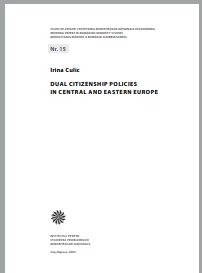Dual Citizenship in Central and Eastern Europe
Dual Citizenship in Central and Eastern Europe
Author(s): Irina Culic
Subject(s): Civil Society, International relations/trade, Politics and society, Comparative politics, Ethnic Minorities Studies, Politics and Identity
Published by: ISPMN Institutul pentru Studierea Problemelor Minorităţilor Naţionale
Keywords: Dual citizenship policies; Transnationalism; Extra-territorial nationalism; Minority protection; Eastern-Western Europe;
Summary/Abstract: The paper provides a historical-sociological investigation of post-communist dual citizenship policies in Central and Eastern Europe, proposing to conceive of citizenship as a means of state building. While dual citizenship policies in Western Europe generally took an inclusionary form, generated by the stringent need to incorporate and assimilate foreign immigrants, and to come to terms with their colonial and world expanding capitalist past, in Central and Eastern Europe they have essentially been differentialist, putting emphasis on ethno-cultural distinctions and privileged historical relationship with a state. In an attempt to synthesize the dominant motives governing the strategies chosen by these states, in the second part of the paper dual citizenship practices are inventoried according to a typology that reveals different state rationalities. Finally, an examination of asymmetries in dual citizenship aims both to further the state building argument, and to point to the tensions inherent in dual citizenship legislation.
Series: STUDII DE ATELIER. CERCETAREA MINORITĂŢILOR NAŢIONALE DIN ROMÂNIA
- Page Count: 40
- Publication Year: 2009
- Language: English
- Content File-PDF

